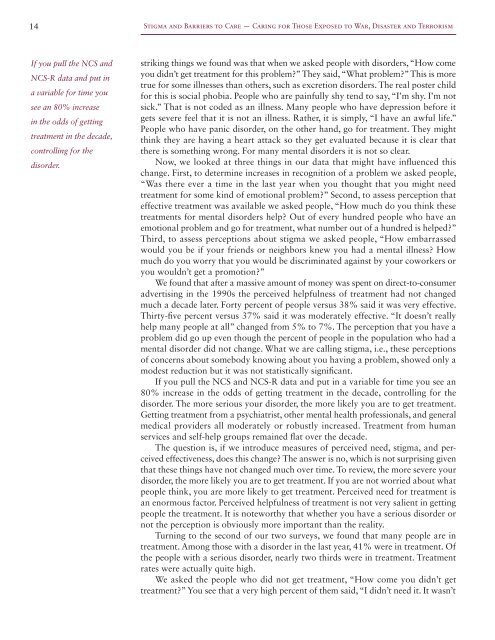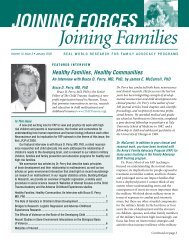stigma and barriers to care - Uniformed Services University of the ...
stigma and barriers to care - Uniformed Services University of the ...
stigma and barriers to care - Uniformed Services University of the ...
Create successful ePaper yourself
Turn your PDF publications into a flip-book with our unique Google optimized e-Paper software.
14<br />
Stigma <strong>and</strong> Barriers <strong>to</strong> Care — Caring for Those Exposed <strong>to</strong> War, Disaster <strong>and</strong> Terrorism<br />
If you pull <strong>the</strong> NCS <strong>and</strong><br />
NCS-R data <strong>and</strong> put in<br />
a variable for time you<br />
see an 80% increase<br />
in <strong>the</strong> odds <strong>of</strong> getting<br />
treatment in <strong>the</strong> decade,<br />
controlling for <strong>the</strong><br />
disorder.<br />
striking things we found was that when we asked people with disorders, “How come<br />
you didn’t get treatment for this problem” They said, “What problem” This is more<br />
true for some illnesses than o<strong>the</strong>rs, such as excretion disorders. The real poster child<br />
for this is social phobia. People who are painfully shy tend <strong>to</strong> say, “I’m shy. I’m not<br />
sick.” That is not coded as an illness. Many people who have depression before it<br />
gets severe feel that it is not an illness. Ra<strong>the</strong>r, it is simply, “I have an awful life.”<br />
People who have panic disorder, on <strong>the</strong> o<strong>the</strong>r h<strong>and</strong>, go for treatment. They might<br />
think <strong>the</strong>y are having a heart attack so <strong>the</strong>y get evaluated because it is clear that<br />
<strong>the</strong>re is something wrong. For many mental disorders it is not so clear.<br />
Now, we looked at three things in our data that might have influenced this<br />
change. First, <strong>to</strong> determine increases in recognition <strong>of</strong> a problem we asked people,<br />
“Was <strong>the</strong>re ever a time in <strong>the</strong> last year when you thought that you might need<br />
treatment for some kind <strong>of</strong> emotional problem” Second, <strong>to</strong> assess perception that<br />
effective treatment was available we asked people, “How much do you think <strong>the</strong>se<br />
treatments for mental disorders help Out <strong>of</strong> every hundred people who have an<br />
emotional problem <strong>and</strong> go for treatment, what number out <strong>of</strong> a hundred is helped”<br />
Third, <strong>to</strong> assess perceptions about <strong>stigma</strong> we asked people, “How embarrassed<br />
would you be if your friends or neighbors knew you had a mental illness How<br />
much do you worry that you would be discriminated against by your coworkers or<br />
you wouldn’t get a promotion”<br />
We found that after a massive amount <strong>of</strong> money was spent on direct-<strong>to</strong>-consumer<br />
advertising in <strong>the</strong> 1990s <strong>the</strong> perceived helpfulness <strong>of</strong> treatment had not changed<br />
much a decade later. Forty percent <strong>of</strong> people versus 38% said it was very effective.<br />
Thirty-five percent versus 37% said it was moderately effective. “It doesn’t really<br />
help many people at all” changed from 5% <strong>to</strong> 7%. The perception that you have a<br />
problem did go up even though <strong>the</strong> percent <strong>of</strong> people in <strong>the</strong> population who had a<br />
mental disorder did not change. What we are calling <strong>stigma</strong>, i.e., <strong>the</strong>se perceptions<br />
<strong>of</strong> concerns about somebody knowing about you having a problem, showed only a<br />
modest reduction but it was not statistically significant.<br />
If you pull <strong>the</strong> NCS <strong>and</strong> NCS-R data <strong>and</strong> put in a variable for time you see an<br />
80% increase in <strong>the</strong> odds <strong>of</strong> getting treatment in <strong>the</strong> decade, controlling for <strong>the</strong><br />
disorder. The more serious your disorder, <strong>the</strong> more likely you are <strong>to</strong> get treatment.<br />
Getting treatment from a psychiatrist, o<strong>the</strong>r mental health pr<strong>of</strong>essionals, <strong>and</strong> general<br />
medical providers all moderately or robustly increased. Treatment from human<br />
services <strong>and</strong> self-help groups remained flat over <strong>the</strong> decade.<br />
The question is, if we introduce measures <strong>of</strong> perceived need, <strong>stigma</strong>, <strong>and</strong> perceived<br />
effectiveness, does this change The answer is no, which is not surprising given<br />
that <strong>the</strong>se things have not changed much over time. To review, <strong>the</strong> more severe your<br />
disorder, <strong>the</strong> more likely you are <strong>to</strong> get treatment. If you are not worried about what<br />
people think, you are more likely <strong>to</strong> get treatment. Perceived need for treatment is<br />
an enormous fac<strong>to</strong>r. Perceived helpfulness <strong>of</strong> treatment is not very salient in getting<br />
people <strong>the</strong> treatment. It is noteworthy that whe<strong>the</strong>r you have a serious disorder or<br />
not <strong>the</strong> perception is obviously more important than <strong>the</strong> reality.<br />
Turning <strong>to</strong> <strong>the</strong> second <strong>of</strong> our two surveys, we found that many people are in<br />
treatment. Among those with a disorder in <strong>the</strong> last year, 41% were in treatment. Of<br />
<strong>the</strong> people with a serious disorder, nearly two thirds were in treatment. Treatment<br />
rates were actually quite high.<br />
We asked <strong>the</strong> people who did not get treatment, “How come you didn’t get<br />
treatment” You see that a very high percent <strong>of</strong> <strong>the</strong>m said, “I didn’t need it. It wasn’t




